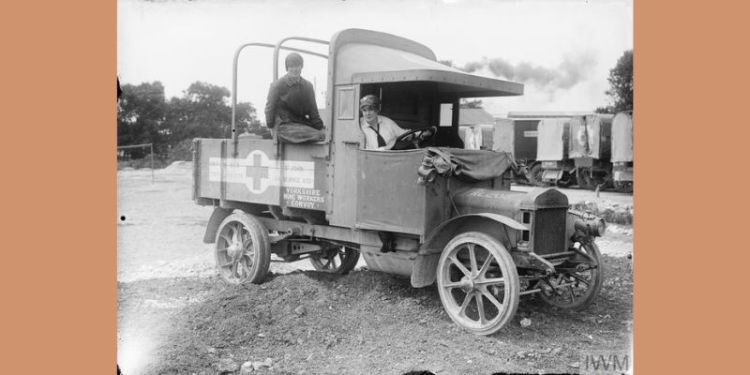Workshop: Motivations behind Women's Humanitarian Commitment in the Twentieth Century

- Date: Thursday 19 June 2025, 09:00 – 16:30
- Location: Parkinson Building
- Type: Conferences
- Cost: Free. <a href="https://forms.office.com/pages/responsepage.aspx?id=qO3qvR3IzkWGPlIypTW3y2U022FHublMnJwuYFrp7FFUNzRCQ044QzZSNTU2VEFBREpGVDlJSUQ5Uy4u&route=shorturl">Registration required</a>.
A workshop hosted by the School of History.
Programme
09:00: Opening remarks
09:30-10:30 Keynote talk
Dolores Martín-Moruno (University of Geneva): ‘Gender and Humanitarianism: Reasons, Emotions, and Experiences’
In The Need to Help (2015), anthropologist Liisa H. Malkki explores the motivations that have led volunteers – namely female agents – to join humanitarian missions. Far from presenting a heroic vision, she lists – amongst other impulses – a feeling of boredom, as well as a desire for danger and adventure. Taking Malkki’s reflections on the humanitarian commitment of women in our contemporary world as a departure point, this lecture seeks to provide a long-term perspective which could allow us to comprehend the reasons, emotions and experiences which have moved a plethora of female actors to help distant others from the beginnings of the humanitarian movement. By using the concepts developed in gender history, the history of emotions and the new history of experience, I will analyse a series of stories starring female relief agents to challenge essentialist interpretations which have explained women’s humanitarian engagement through their alleged compassionate nature. This theoretical framework will enable us to understand how the humanitarian movement has allowed women to participate in international politics by claiming their citizenship, struggling against class inequalities, racial segregation and sexual discrimination.
About the speaker
Dolores Martín-Moruno has been Swiss National Science Foundation Professor at the Institute for Ethics, History and the Humanities at the University of Geneva’s Faculty of Medicine (Switzerland). This year she will join the Milà y Fontanals Institution for Research in Humanities (Spanish National Research Council, Barcelona) as a senior researcher to pursue her work at the crossroads of Gender history, humanitarian medicine and global health. She has published widely on the history of humanitarianism, the histories of medicine and care, as well as the histories of emotions and experience.
10:30-11:00 Coffee break
11:00-13:00 Panel 1
- Delphine Diaz (Université de Reims Champane-Ardenne/Madrid Institute for Advanced Study): ‘Searching For and Repatriating Child Refugees During the Great War: The International Feminist Bureau of Lausanne (1914-1919)’
- Marina Pérez de Arcos (University of Oxford/Ca' Foscari University of Venice): ‘Womens Roles and Motivations: Drivers of Humanitarian Action at Spain’s European War Office during the First World War’
- Mercedes Yusta Rodrigo (Université Paris 8): ‘Bernadette Cattanéo and the Spanish Civil War: Between Anti-Fascist Solidarity and Humanitarian Concerns’
Chaired by Peter Anderson (University of Leeds)
13:00-14:30 Lunch
14:30-16:30 Panel 2
- Siân Roberts (University of Birmingham): ‘An “Appeal to the Hearts of Friends”: Quaker Women, Refugees and Transnational Humanitarian Relief, 1914-1950’
- Mónica García Fernández (Universidad Autónoma de Madrid): ‘A Woman of Action: Mary Hoyt Wiborg and Her Humanitarian Commitment During the First and Second World Wars’
- Alba Martínez (University of Leeds): ‘The Women of UNRRA: Unravelling the Motivations Behind Their Humanitarian Commitment’
Chaired by Matthew Frank (University of Leeds)
How to attend
Attendance at this workshop is free, but registration is required. Please register via the online form.
This workshop takes place in room 2.20 of the Parkinson Building.
Acknowledgements
This workshop is organised by Alba Martínez, Marie Sklodowska-Curie Fellow in the School of History. It is funded by UKRI under the UK Government’s Horizon Funding Guarantee (Grant number EP/YO28341/1 – WomenHuNet)
Image credit
Two Women British Red Cross Society, Voluntary Aid Detachment (VAD) ambulance drivers. The vehicle is from the Yorkshire Mine Workers' Convoy. Etaples, 27th June 1917. Image copyright Imperial War Museum, item Q 2450. Used under non-commercial license.

